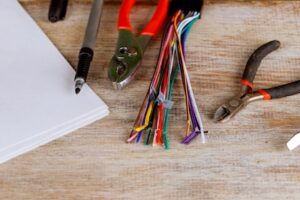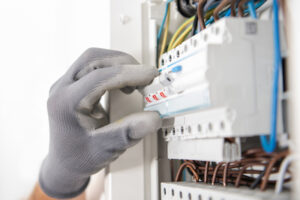9 Essential Tips for Safe Home Electrical Repairs
Today, electricity is used in some capacity for almost all of our activities, whether they be professional or domestic. The quality of life has significantly improved thanks to electricity advancements, but the risk of electrocution has also increased. Many household appliances have safety features and backup plans to ensure user security in the event of a system failure.
When fixing the electric system, you must, however, go beyond these safeguards. You must take specific precautions to make sure you and the people you work with are safe because you are exposed to the risks of electrocution. The fundamental safety measures you must implement to guarantee secure working conditions are these key suggestions. They reduce the possibility of electrocution significantly.
1. Know the Electrical Load in Your Home
Before you start working on your electrical system, you have to check the electrical load of your system. Your electrical load will dictate many of your actions and purchases if you need to make any. Your home’s electrical load, which is the quantity of energy required to keep everything operating, is determined by the electrical load that each electrical appliance has.
When adding new circuits or equipment, knowing your electrical load is essential. You can easily calculate your home’s electrical load to know if you need to add the capacity before any circuits or appliances. Understanding your electrical load is essential to utilizing the energy in your home more efficiently.

2. Get the Right Tools
To start any work on your electric system, you cannot compromise on the tools you will need. Do not improvise with knives or anything not designed to fix electrical equipment. You must have screwdrivers with the right design to reach some of the screws that are deeply seated in the equipment. You must also have pliers and wire cutters that can help you pull back the plastic covering the wires. Many of the necessary tools usually come together in a handyman’s toolbox. Having these tools will ensure that you can start to do the work and see it to the end. No work will be done without tools, and you will likely get frustrated or injured.
3. Get Your Safety Gear
Working with electricity is very dangerous, and even professionals get electrocuted sometimes. The best way to prevent this and minimize the damage in the case of an incident is to get the right safety gear. For starters, you must always have insulated gloves when working with electricity. A hard hat is also a good move when working in a place with hanging wires or the danger of wires dropping down. Sparks that enter your eyes while working with electricity run the risk of seriously harming your vision. To protect your eyes and face, safety goggles and a face shield are necessary. Safety shoes are also necessary to ensure that you do not turn into a grounding option for any electricity in contact with your body. Flame-resistant clothing is also necessary in case any sparks land on your clothes; they will not cause combustion or fire.
4. Ensure Your Tools Are Well Insulated
When getting tools to use with electric currents, they must be well insulated and calibrated. Different electrical loads call for different insulation levels, which is why many electrical tools have a load they can handle. Voltage-rated insulation helps you understand the amount of electrical load your tools can handle safely.
While insulated tools will keep you from being shocked, they also serve another critical purpose. They ensure your equipment and electrical system will not sort-circuit or even be damaged. It would be best to always inspect your tools before using them to ensure there are no cracks or burns on the insulation. Also, ensure that reputable organizations have rated your tools before you buy them.
5. Ensure Your House Is Well Grounded
Grounding is one of the key safety features in the electric system that helps to ensure that electrocution does not happen. If it does, the grounding also helps minimize the voltage so that the electrocuted person incurs less injury. If a house is not well-grounded, the chances of being electrocuted when repairing electrical issues skyrocket.
The main idea behind modern grounding is that the earth offers lower resistance than the body of the person who touches the exposed wires. The system is set up so that the electricity will flow to lower resistance than to the higher resistance. By ensuring your house is grounded, you can confidently work on making any necessary repairs. However, if it is not, it is better to call in a professional to avoid any injury.
6. Check the Wiring
To start any work on your home’s electrical system, you have to think about the wiring and circuits in your home. The system is not a single circuit running all through, but several circuits working together. You must know which circuit you are working on and which ones you do not want to interfere with. The various circuits will have their own specific access points.
Understanding each one can help you identify which one has an issue and which ones are okay. You can use circuit checkers and voltage meters to measure the different aspects of the circuit. A multi-meter is also very helpful since you can identify faulty switches and loose wires quite easily. If you inspect your wiring and come across an issue that you are unable to resolve, it is crucial to seek immediate assistance from a professional. Mishandling certain problems could lead to severe consequences for the entire system. It’s best to rely on the expertise of a qualified professional to address the issue safely and effectively.

7. Turn Off the Mains
It’s very easy to forget to turn off the mains electricity when doing repairs. The trip to the main panel may seem far, and you may think that turning off the switches connected to the appliance is enough. However, you could be dealing with a faulty connection or wire, and turning off the switch will be insufficient. Another possibility is that the circuit has open wires, in which case the current is still flowing even when the switches are off. The entire system will be off if the mains are turned off. You can be certain that no electricity or current is flowing to the appliance or wires you are working on.
8. Ensure Your Parts Are of the Best Quality
When fixing your electrical system, it is easy to find that you have faulty parts and equipment. Some of these could be the main cause of the electrical issues or the indirect causes. Some of the equipment that could cause these issues are faulty panels and circuit breakers or conduits. When you want to replace these, you have to select a reputable supplier with the right knowledge. They must have a good understanding of home control panels and how each fits into the various home systems. Finding a good supplier is essential to the success of your repairs.
9. Make Good Wiring Connections
When you get the replacement equipment or you spot an issue in the wiring, you must ensure that you get the wiring right. Many issues that occur within the electrical system develop due to poor wiring, which leads to short circuits and leakages. Ensuring you wind the wires tight and leave no ends peeking out will help to keep the connections secure. It is also essential that you understand how all the connections work before you start working on them.
Endnote
When doing repairs for your electrical system in your home, ensure that you have all the safety measures crossed off. The wrong move can land you or someone else in the hospital. You must know your electrical load before you start and get the right tools and safety gear. Your tools must be well insulated, and ensure your house is grounded before you check the wiring. Turn off the mains before connecting your equipment, and ensure that all your connections are done properly.
